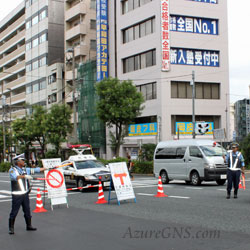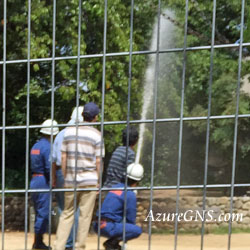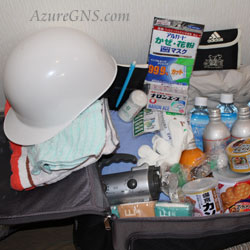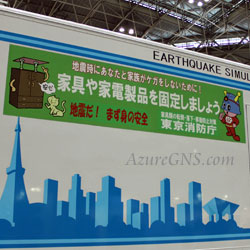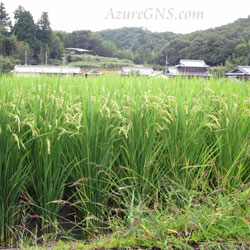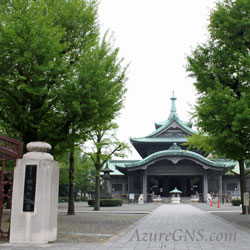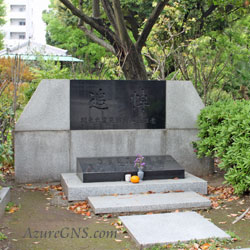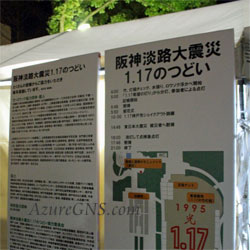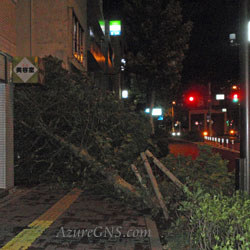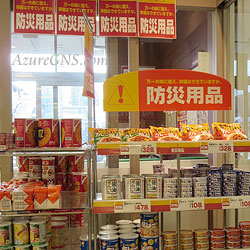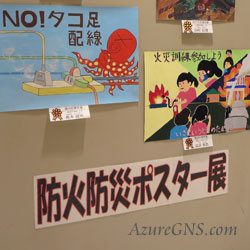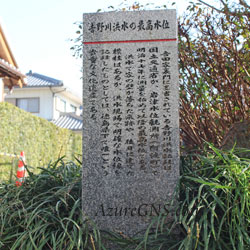(9月1日)
Bosai-no-hi;
The Disaster Prevention Day
(September 1st)
●防災の日 Bosai-no-hi; the Disaster Prevention Day; Disaster Drill Day
●防災対策 disaster prevention measures
●防災計画 disaster prevention plan;
(万一の場合)代替 [防災] 計画 contingency plan
●避難命令 evacuation order
●避難場所;避難所 disaster shelter
●避難訓練 evacuation drill; fire drill
●避難する (to) take refuge; (to) evacuate
●避難梯子 fire escape
●天災 natural disaster
●地震 earthquake; quake
●関東大震災 the Great Kanto Earthquake
●台風 typhoon
●防災用品 emergency supplies
●非常持ち出し袋 emergency kit; emergency bag;
survival kit; survival bag
●懐中電灯 flashlight
●ラジオ radio
●飲料水 drinking water
●缶詰 canned food
◆1960年(昭和35年)に9月1日は防災の日に制定されました。
September 1st was designated as Bosai-no-hi, the Disaster Prevention Day, in 1960 (Showa 35th yr).
◆毎年、8月30日から9月5日までは防災週間です。
Disaster Prevention Week is from August 30th to September 5th every year.
◆政府を初め各公共機関では防災対策のさまざまな行事、訓練、会議が行われます。
The government and other public institutions hold various events, drills, and meetings to raise awareness of disaster prevention measures.
◆地域、職場、学校でも避難訓練や消防訓練が行われます。
People take part in evacuation drills or fire drills in their communities, workplaces, or schools.
◆家庭では非常持ち出し袋の点検、避難場所の確認や、家具や家電が地震の時に転倒しないように固定する良い機会となります。
It is a good opportunity to check emergency kits and shelters, and to ensure that all furniture and electrical appliances are secure and in no danger of falling over.
◆最近では台風、土砂崩れ、洪水、地震などの自然災害だけではなく、原子力発電所の事故や、戦争やテロのような有事に対する防災も大事な課題です。
Nowadays, we not only have to prepare for natural disasters, such as typhoons, landslides, floods, and earthquakes, but also for accidents that may occur at atomic power plants or national emergencies such as war and terrorism.
◆防災の日が9月1日になった理由は2つあります。
There are two reasons why Bosai-no-hi falls on September 1st.
◆9月1日は太陽暦で立春から210日目です。
According to the solar calendar, September 1st is the 210th day after Risshun; the first day of spring.
◆この日は昔から「二百十日」と呼ばれ、台風の多い時期が始まります。
Traditionally, this day has been called ‘Nihyaku-toka’, the start of the typhoon season.
◆ちょうど中稲(なかえ)の開花期と重なり、農家に大きな被害がでることもあります。
Around this time, rice begins to bloom, and farmers often suffer damage to their crops.
◆9月1日が選ばれたもうひとつの理由は関東大震災です。
The other reason why September 1st was chosen is the Great Kanto Earthquake.
◆1923年(大正12年)9月1日午前11時58分、日本の中心地である関東がマグニチュード7.9の地震に見舞われました。
At 11:58 am, September 1st, 1923 (Taisho 12th yr), the center of Japan, the Kanto area, was struck by a great earthquake of magnitude 7.9.
◆死者と行方不明者合わせて約15万人という大きな被害を出しました。
The total number of dead and missing persons was about 150,000 people.
◆午前11時58分というちょうど昼食の支度時だったこともあり、その地域に大火災が起きました。
As the earthquake occurred at 11:58 am, lunch preparation time, it led to rampant fires in the area.
◆地震により全壊家屋は約13万軒、焼失家屋は約45万軒でした。
About 130,000 houses were completely destroyed by the quake, and about another 450,000 houses burnt down in the ensuing fires.
◆震災の混乱の中、朝鮮人が暴動を起こしているという流言が出て、約6千人の朝鮮人が殺されました。
In the chaos of the quake, about 6,000 Koreans were slaughtered when a rumor broke out that Koreans were rioting.
◆また社会主義者が朝鮮人を操っているという流言が出て、社会主義者に対する弾圧が強まりました。
Furthermore, a rumor spread that the socialists were behind the supposed Korean riot.
◆政府はこの流言を社会主義者のさらなる弾圧の正当化に利用しました。
The government used this rumor to further justify oppressing the socialists.
◆関西では9月1日ではなく、1月17日に防災訓練をする場合もあります。
In the Kansai area, some carry out an evacuation drill on January 17th, rather than on September 1st.
◆1995年(平成7年)1月17日午前5時46分に、明石海峡を震源としたマグニチュード7.3の阪神・淡路大震災が発生しました。
The 7.3-magnitude Great Hanshin-Awaji Earthquake, whose seismic epicenter was in the Akashi Strait, occurred at 5:46 am on January 17th, 1995 (Heisei 7th).
◆最近では地震といえば関東大震災や阪神・淡路大震災より、2011年(平成23年)3月11日午後2時46分に発生した東日本大震災を思い出す人の方が多いでしょう。
In recent times, when speaking of earthquakes, the Great East Japan Earthquake, at 2:46 pm on March 11th, 2011 (Heisei 23rd yr), more often comes to mind than the Great Earthquakes of Kanto and Hanshin-Awaji.
◆地震直後の大津波が東北地方と関東北部の太平洋側に壊滅的な被害をもたらしました。
The coast of the Tohoku and the northern Kanto districts were devastated by the huge tsunami immediately after the earthquake.
◆地震と津波の影響で福島県の原子力発電所ではメルトダウンなどの、放射性物質が放出する事故が起こり、ピーク時には約165,000人の人が避難を余儀なくされました。
The earthquake and tsunami caused nuclear accidents where radiation leaked including a meltdown in the Fukushima nuclear power plant and about 165,000 people were forced to evacuate at the height of chaos.
◆地震国である日本には近い将来さらなる大地震が起こると言われています。
Japan is a country subject to frequent earthquakes, and furthermore, a bigger earthquake in the near future is anticipated.
◆毎年、日本は梅雨時には集中豪雨の被害を受け、秋には台風が日本を直撃します。
Every year, Japan is hit by downpours in the rainy season and by typhoons in autumn.
◆人間はこのような自然の脅威を押さえ込むことはできません。
It is impossible for humans to suppress such natural threats.
◆それゆえに、被害を最小限にするため常に備えと心構えをするべきです。
Therefore, we should always try to be prepared both physically and mentally in order to keep damage to a minimum.
(より詳しい情報は「我が家の防災の日」をご覧下さい。)
(Please see “Our Disaster Prevention Day Experience” for further information.)
Copyright (C) Azure Global Network Services. All Rights Reserved.
